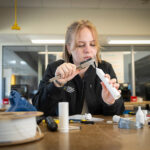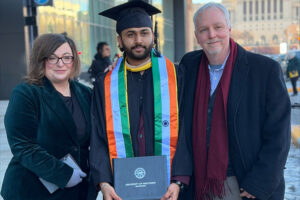The UWM College of Engineering & Applied Science is now enrolling students for the fall launch of its new master’s of science degree program in Connected Systems Engineering. This first-of-its-kind program in Wisconsin combines engineering, business and data science with real-world applications in advanced manufacturing.
Coursework includes topics that are increasingly relevant to manufacturing, such as artificial intelligence, cybersecurity, the digital supply chain and more.
The interdisciplinary major will be offered by the Industrial and Manufacturing Engineering Department in collaboration with UWM’s Lubar College of Business and UWM’s Connected Systems Institute.
This master’s program is designed to attract and empower students who seek to upskill or reskill to prepare for current and future careers in the advanced manufacturing and service industries.
A need for industry
Eighty-three percent of 400 executives recently surveyed for the 2021 Wisconsin Manufacturing Report stated they were having difficulty finding the right talent in manufacturing data analytics, AI, cloud computing, cybersecurity, robotics and automation, among other key skills related to Industry 4.0.
“We believe this interdisciplinary master’s program is a critical step to closing the current industry knowledge gap and preparing a pipeline of future industry leaders,” said Michael Cook, Rockwell Automation’s director of global industry-academia and engagement. “We fully support this program.”
The degree requires 31 credits, consisting of a set of core courses in connected systems engineering that will involve students working on case scenarios using the CSI’s automated manufacturing testbeds.
The Connected Systems Institute is a collaborative research facility with affiliated faculty from the College of Engineering & Applied Science, the Lubar College of Business and the School of Information Studies, all working with industry partners to drive innovation in manufacturing.
Understanding business challenges
One major focus of CSI, which has onsite manufacturing testbeds and a digital twin lab, is to understand business challenges faced by manufacturers and partner with them to incorporate AI and other smart technology solutions to improve their business operations.
Additional program requirements include a capstone course, technical writing and a collection of self-selected technical electives.
Students may select electives representing focus areas including industrial engineering, manufacturing engineering, enterprise resource planning, digital supply chain management, artificial intelligence, machine learning and cybersecurity, and mechatronics and robotics.
The program is designed to be completed in three semesters of full-time enrollment with students taking 10 to 11 credits per semester. Part-time students can complete the program in as few as five semesters.







